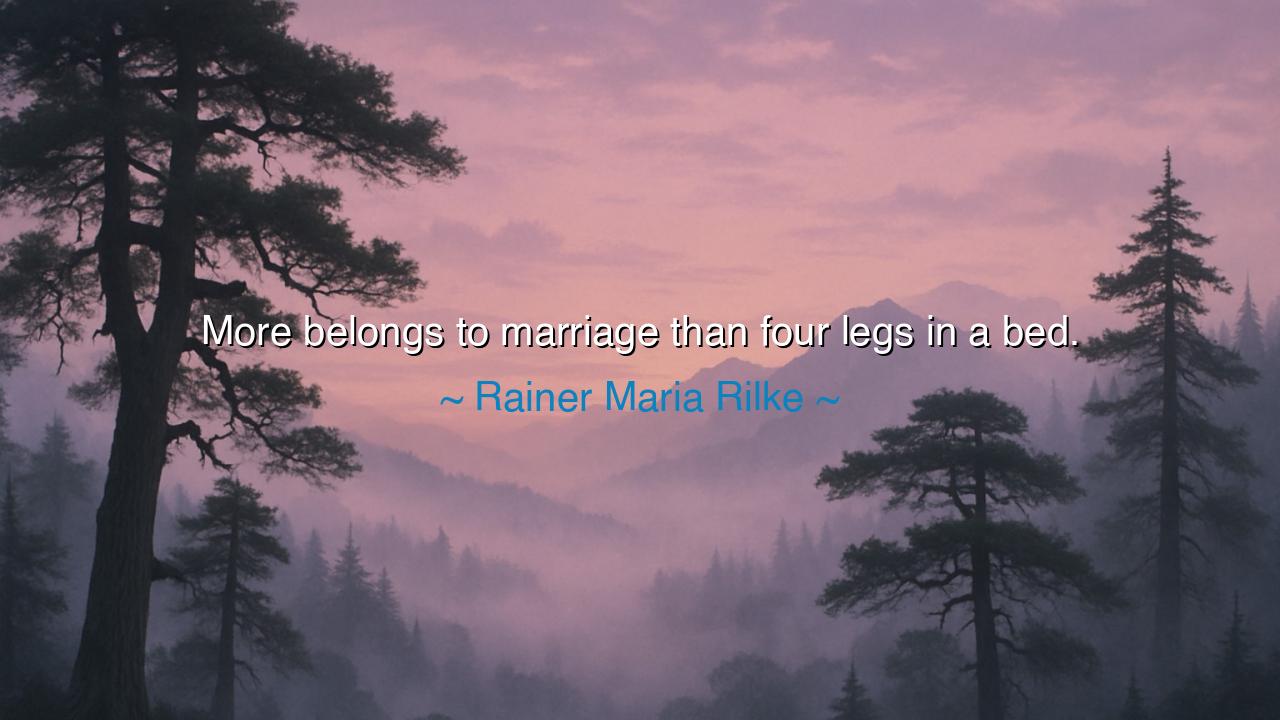
More belongs to marriage than four legs in a bed.






The words of Rainer Maria Rilke, “More belongs to marriage than four legs in a bed,” cut through the illusions of desire and reach toward a truth as old as the human heart. Spoken by one of the most profound poets of the soul, this line is not merely a commentary on marriage, but a meditation on the nature of love itself — that it is something sacred, laborious, and transcendent, not a fleeting indulgence of flesh. Rilke, who spent his life exploring the mystery of existence and the solitude of the human spirit, reminds us that true union is not measured by proximity of bodies, but by the intertwining of destinies, the patience of understanding, and the growth of two souls seeking the divine through one another.
To understand this saying, one must first understand Rilke’s vision of love. He did not see marriage as a merging that erased individuality, but as a courageous partnership where two beings, standing side by side, protect the solitude of the other. In his Letters to a Young Poet, he wrote that love is not possession, but “a high inducement to the individual to ripen, to become something in himself, to become world, to become world for himself for another’s sake.” Thus, when he declares that “more belongs to marriage than four legs in a bed,” he speaks against the reduction of love to physical passion or convenience. He speaks of the spiritual labor of love — the quiet, daily work of tending to another’s heart, of forgiving, of listening, of building a shared life not upon lust, but upon trust and devotion.
Throughout history, the ancients have echoed this same truth. In the wisdom of the Greeks, marriage was seen not merely as union, but as a moral training ground — a place where man and woman learned temperance, patience, and the balance between duty and affection. Socrates, when asked about marriage, said, “By all means, marry. If you get a good wife, you will become happy; if you get a bad one, you will become a philosopher.” Even in jest, he revealed the deeper teaching: that marriage refines the soul through both joy and trial. The ancients knew what Rilke expressed with poetic clarity — that love of the body without love of the soul is a flame that consumes but does not warm.
Consider, too, the story of Marcus and Arria, a Roman couple bound not merely by affection but by shared virtue. When Marcus faced death under imperial decree, Arria, his wife, chose to die with him rather than live without his presence. Yet before doing so, she took his dagger and, stabbing herself first, handed it back saying, “It does not hurt, my love.” Such devotion was not born of passion, but of a bond that transcended fear and flesh. Their love was not four legs in a bed, but two hearts in eternity. This, too, is what Rilke meant — that the sacred covenant of marriage is woven from sacrifice, endurance, and the courage to grow together even in pain.
Rilke’s insight is also a warning to the modern world, which so often confuses love with desire, and intimacy with indulgence. In a time when relationships are often built upon pleasure and convenience, his words call us back to depth. For marriage, he teaches, is not the fulfillment of happiness, but the creation of meaning. It is not the ending of loneliness, but the learning of companionship. It is a field where two gardeners labor, where the harvest comes only through patience and care. The ancients would have said: “To lie together is easy; to live together is divine work.”
This truth, however, does not strip love of its passion — it ennobles it. For passion without purpose fades like fire without wood, but when joined to reverence and understanding, it becomes an eternal flame. Rilke believed that marriage should lead not to comfort, but to transformation — that through the challenges of loving another, we learn to love more wisely, more humbly, more wholly. The bed may be the beginning of union, but the heart must become its home.
Let this, then, be the lesson to those who seek to love and to be loved: do not measure your union by pleasure alone, but by the depth of your devotion. Tend to your marriage as one tends to a sacred flame — with gentleness, attention, and awe. Do not seek in it a refuge from loneliness, but a pilgrimage toward truth. For as Rilke teaches, marriage is not the end of love’s journey, but the crucible where love is purified, tested, and made eternal.
Thus, remember his words — “More belongs to marriage than four legs in a bed.” Behind them lies the wisdom of centuries: that the body may bring lovers together, but only the soul can keep them bound. The flesh fades; the beauty of companionship endures. And those who understand this truth will not merely find love — they will become love itself.






AAdministratorAdministrator
Welcome, honored guests. Please leave a comment, we will respond soon